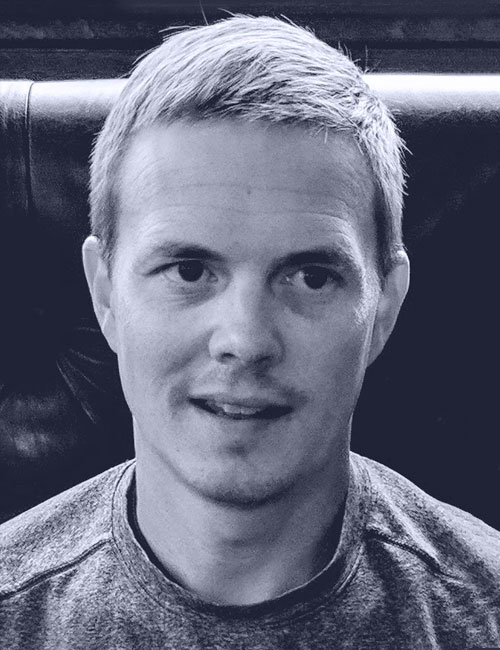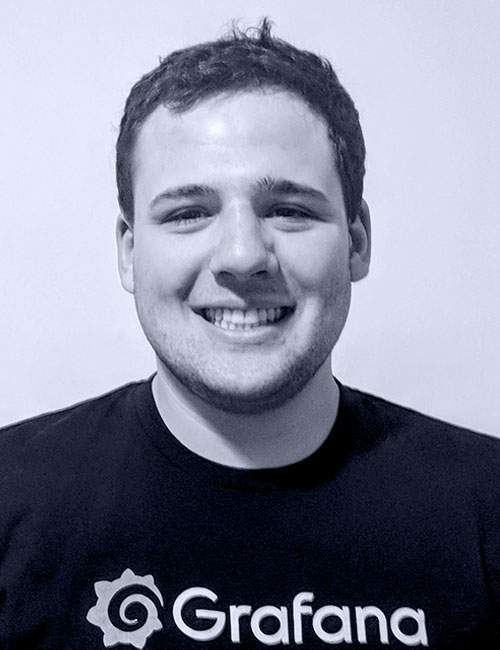
February 13, 2018 | NEW YORK
InfluxDays New York 2018 was a great event and we all had a blast!
In case you missed it, here is a list of the conference speakers and link to their talk.

PAUL DIX
Co-Founder and CTO, InfluxData
@pauldix
InfluxData Platform Future and Vision
Paul will outline his vision around the platform and give the latest updates on IFQL (a new query language), the decoupling of query and storage, the impact of hybrid cloud environments on architecture, cardinality, and discuss the technical directions of the platform. This talk will walk through the vision and architecture with demonstrations of working prototypes of the projects.
About Paul Dix: Paul Dix is the creator of InfluxDB. He has helped build software for startups, large companies and organizations like Microsoft, Google, McAfee, Thomson Reuters, and Air Force Space Command. He is the series editor for Addison Wesley’s Data & Analytics book and video series. In 2010 Paul wrote the book Service-Oriented Design with Ruby and Rails for Addison Wesley’s. In 2009 he started the NYC Machine Learning Meetup, which now has over 7,000 members. Paul holds a degree in computer science from Columbia University.

Sean Porter
Co-founder and CTO, Sensu
@portertech
Data Collection & Prometheus Scraping with Sensu 2.0
Applications are complex systems. Their many moving parts, component and dependency services, may span any number of infrastructure technologies and platforms, from bare metal to serverless. As the number of services increases, teams responsible for them will naturally develop their own preferences, such as how they instrument their code or how and when they receive alerts.
Sean will demonstrate how Sensu 2.0 is designed to collect monitoring and telemetry data from these heterogeneous environments and store them in InfluxDB. Sensu 2.0 is the next release of the open source monitoring framework, rewritten in Go, with new capabilities and reduced operational overhead. Using Sensu alongside InfluxDB, Sean will go over various patterns of data collection, including scraping Prometheus metrics, and show how Sensu enables self-service data collection for service owners.
About Sean Porter: Sean Porter is the creator of Sensu, the open source monitoring tool, and the co-founder and CTO of Sensu Inc. Sean is a seasoned systems operator and software developer with nearly a decade of experience in automating infrastructure. As CTO of Sensu Inc, he oversees the development of Sensu, and works with users to better understand how Sensu can help them solve complex monitoring problems. Outside of work, he collects photography equipment, scotch whiskey, and Warhammer 40k miniatures.

Colin Breck
Staff Software Engineer, Tesla
@breckcs
From a Time-Series Database to a Key Operational Technology for the Enterprise
It is important for a time-series database to provide efficient storage, aggregation, and query of time-series data. Elevating a time-series database to a core operational technology of the enterprise, however, involves so much more. In this talk, I will explore important considerations that take a time-series database from being just another data-store, to a critical infrastructure for operational intelligence. I will explore challenges related to time, change management, incorporating asset models from the business domain, and integration with other operational technologies, like streaming-data platforms.
About Colin Breck: Colin Breck has almost two decades of experience in developing time-series infrastructures for the monitoring and control of industrial applications. At Tesla, he works on distributed systems for the monitoring, aggregation, and control of distributed, renewable-energy assets. Previously, he worked on the PI System at OSIsoft, including the time-series database and publish-subscribe infrastructure. He writes monthly at blog.colinbreck.com.

Rob Frohnapfel
Director, Comcast
Turning Cloud Metrics into Results
You have discovered InfluxDB and now have a plethora of metrics at your fingertips. Next, you want to apply these metrics and generate impactful, tangible business results. But where do you start? This talk will describe how Comcast was able to apply our multi-tenant cloud metrics to identify huge opportunities, partner with the business, and drive outcomes that include reliable cloud performance and the return of real dollars to the business…not to mention happy customers!
About Rob Frohnapfel: The mission of our team is simple – remove the infrastructure-heavy lifting from our development teams and enable them a frictionless experience to deploy their applications. Over the years we have delivered IaaS and SDS, and we are now focused on Cloud Foundry PaaS (Pivotal & Open Source CF), Kubernetes, and other “above the value line” services for Comcast. Our platforms host thousands of unique applications, tens of thousands of virtual machines and containers, dozens of petabytes of storage and an expanding portfolio of homegrown telemetry and automation. To our internal customers, we are a direct competitor to the top public cloud providers.

Tom Wilkie
Founder, Kausal
@tom_wilkie
The RED Method: How to Instrument Your Services
The RED Method defines three key metrics you should measure for every microservice in your architecture; inspired by the USE Method from Brendan Gregg, it gives developers a template for instrumenting their services and building dashboards in a consistent, repeatable fashion.
In this talk, Tom Wilkie will discuss patterns of application instrumentation, where and when they are applicable, and how they can be implemented with Prometheus. He’ll cover Google’s Four Golden Signals, the RED Method, the USE Method, and Dye Testing. He’ll also discuss why consistency is an important approach for reducing cognitive load. Finally, he’ll talk about the limitations of these approaches and what can be done to overcome them.
About Tom Wilkie: Tom is the founder of Kausal, a new company working on Prometheus & Cortex. Previously he worked at companies such as Weaveworks, Google, Acunu and XenSource. In his spare time, Tom likes to make craft beer and build home automation systems.

David Cromberge
Senior Backend Developer, Outlyer
Why You Definitely Don’t Want to Build Your Own Time Series Database
At Outlyer, an infrastructure monitoring tool, we had to build our own TSDB back in 2015 to support our service. Two years later, we decided to take a different direction after seeing for ourselves how hard it is to build and scale a TSDB. This talk will review our journey, the challenges we hit trying to scale a TSDB for large customers and hopefully talk some people out of trying to build one themselves because it is not easy!
About David Cromberge: David Cromberge is a backend developer at Outlyer, a modern monitoring and analytics service for microservices. At Outlyer, David has worked on scaling the time series database backend infrastructure.
Prior to Outlyer, David worked on modernizing legacy applications to event-driven architectures, firstly at an Asset Management Company in Cape Town, as well as an email service provider in Brighton. David is now based in London.

Jacob Lisi
Software Engineer, Grafana Labs
What Does Kubernetes Look Like?: Performance Monitoring & Visualization with Grafana
Monitoring Kubernetes is vital to understanding the health and performance of a cluster, but which metrics are most important to add to your dashboards and alert on? Jacob will discuss how to most effectively monitor and visualize your Kubernetes cluster using the Grafana Kubernetes plugin and PromQL. Some of the topics of discussion include(1) how and what to collect when monitoring Kubernetes, (2) how to bring your Grafana dashboards to the next level by using Kubernetes as a data-source, and (3) what to do when managing multiple clusters. All of these topics and more will be discussed to help people get the most out of their Kubernetes monitoring.
About Jacob Lisi: As a software engineer on Grafana Lab’s Hosted Platform Team, Jacob works on a variety of projects, with a special interest in ensuring the proper tooling is in place for monitoring various Kubernetes clusters. Recently, he has developed a Grafana Kubernetes plugin that plays well with PromQL. He loves working at Grafana Labs because it gives him the chance to contribute to the open source community and collaborate with a passionate, worldwide group of developers to advance the state of the field.

Ryan Betts
Director of Engineering, InfluxData
@ryanbetts
InfluxDB Internals
Ryan will expand on his popular blog series and drill down into the internals of the database. Ryan will discuss optimizing query performance, best indexing schemes, how to manage clustering (including meta and data nodes), the impact of IFQL on the database, the impact of cardinality on performance, TSI, and other internals that will help you architect better solutions around InfluxDB.
About Ryan Betts: Ryan is the Director of Engineering at InfluxData responsible for the core database platform. Prior to InfluxData, Ryan was the second employee and CTO at VoltDB. VoltDB provides an in-memory database for applications that require an unprecedented combination of data scale, volume, and accuracy. Prior to VoltDB, Ryan spent time in various leadership roles at IBM and Lucent Technologies. Ryan is an alumnus of Worcester Polytechnic Institute.

Nathaniel Cook
Member of Technical Staff, InfluxData
@nathanielvcook
Kapacitor Stream Processing
Kapacitor is the brains of the TICK Stack. Nathaniel will cover the stream processing capabilities of Kapacitor, how to process data before it gets stored in InfluxDB and after it is stored, best practices around anomaly detection and machine learning. In addition, Nathaniel will discuss how to configure the clustered version of Kapacitor.
About Nathaniel Cook: Nathaniel is the leader of the Kapacitor Project at InfluxData. Nathaniel started his career as an operations engineer, trying to make data do the hard work of monitoring and managing large scale SaaS products. Along the way he learned some data science and machine learning and put them to use detecting anomalies in time series data. Nathaniel holds an MS degree from University of Illinois.

Katy Farmer
DevRel, InfluxData
@TheKaterTot
Installing the TICK Stack and Your First Query
This session assumes that you are new to the TICK Stack and looking at how to get started. Bring your laptop, we will have the Internet connection! Download the TICK Stack, get it up and running, load your first data and produce interesting graphs, alerts and notifications to Slack all by the end of the session.
Writing Queries (InfluxQL and TICK)
This session will help you write your first queries using InfluxQL. Katy will then share best practices to help make your queries efficient and fast.
About Katy Farmer: Katy lives in Oakland, CA with her husband and two dogs (at least one of whom talks to her about fun, technical stuff). She loves to experiment with code, break stuff, and try to fix it. She learned to code at Turing School of Software and Design in Denver, CO, and it gave her the perfect chance to break stuff before she knew how to fix it. Ask her about Ruby, OOP, Go, natural language processing, Russian Literature, Star Wars, Dragon Age, chord progressions. For extra credit bring some Sour Patch Kids!

Margo Schaedel
DevRel, InfluxData
@mschae16
Chronograf and Dashboarding
This hands-on session will explore the Chronograf project. Chronograf is the user interface component of the TICK Stack. You will learn on how to set up Chronograf, building your first set of dashboards, creating TICK scripts, setting alerts, and finally how to monitor and manage your InfluxData installation. Finally a brief overview of how to set up multi-user Chronograf will be discussed.
About Margo Schaedel: Margo is a software developer from Denver, CO where she recently completed the front-end engineering program at the Turing School of Software and Design. Her decision to transition into software development stems from a keen thirst for new challenges, an affinity for problem-solving, and a significant alignment to community-driven growth. When not firmly planted in front of the computer coding, you can find her eating her way through Denver, rushing to hike the next 14er, or skipping off to the coast for scuba diving the big blue.

Noah Crowley
DevRel, InfluxData
@noahcrowley
Writing a Telegraf Plugin (Go experience Required)
Telegraf is a plugin-driven server agent for collecting & reporting metrics and there are many plugins already written to source data from a variety of services and systems. However, there may be instances where you need to write your own plugin to source data from your particular systems. In this session, Noah will provide you with the steps on how to write your own Telelgraf plugin. This will require an understanding of the Go programming language.
About Noah Crowley: Noah is a Developer Evangelist at InfluxData, focused on DevOps with a dash of IoT. He has worked as a systems administrator, audio engineer, production coordinator for an animation studio, and as a software developer building DevOps tools. Noah holds a master’s degree from the Interactive Telecommunications Program at NYU, where he focused on augmented reality, physical computing, and interaction design.

Michael DeSa
Software Engineer, InfluxData
@mjdesa
Advanced Kapacitor
Michael DeSa will go over some of the advanced topics in Kapacitor such as joins, templated tasks, and debugging your tasks. Prerequisite: Intro To Kapacitor.
Downsampling Data
In this session you will learn downsampling strategies and techniques for your InfluxDB data.
About Michael DeSa: Michael DeSa is a Software Engineer at InfluxData who focuses on increasing the performance capabilities of InfluxDB. He has led the InfluxDB training course across the US, providing students with an in depth understanding of how InfluxDB works as well as sharing best practices. He has a degree in Math, with a focus on Abstract Algebra, from the University of California, at Berkeley and was an Instructor of the Web Development Immersive series at General Assembly in San Francisco.

Gianluca Arbezzano
Site Reliability Engineer, InfluxData
@GianArb
A True Story About Database Orchestration
InfluxCloud is a SaaS that enables customers to run InfluxDB and all the components of the TICK stack. As a SaaS, it is the responsibility of InfluxData to manage it fully to ensure speed, reliability, and uptime – all the more important considering customers rely on this service to maintain the SLAs of their own service! InfluxCloud currently uses AWS as the cloud provider, running over 1,500 EC2 instances across 14 regions and uses CoreOS and Docker to distribute and manage containers across the infrastructure. As of December 2017, there are over 7,000 containers running in this infrastructure serviced by a powerful set of tools to orchestrate and manage all databases in this vital cloud.
During this talk, Gianluca will share the architecture of the project, describe the criticalities of the infrastructure and how the team strives to make this powerful service secure, fast, and reliable for all customers using InfluxCloud.
About Gianluca Arbezzano: Gianluca Arbezzano is an SRE at InfluxData. He is a big Open Source contributor for several projects including and not limited to Zend Framework, Docker, and InfluxDB. He is also a Docker Captain and a member of the Doctrine ORM developers team. He is passionate about developing best practices for developers worldwide and has recently been focused on building scalable infrastructures on top of AWS, DigitalOcean and OpenStack.
He is familiar with several programming languages, such as Javascript and Golang and is an active speaker at conferences throughout Europe, sharing his experiences and knowledge on projects that he is leading.

Chris Goller
Architect, InfluxData
Using InfluxDB for OpenTracing
OpenTracing is starting to gain traction with many applications but what is the right approach to implementing OpenTracing within your app? Chris Goller will discuss how you can best tackle the use of this technology to find issues that can be solved to keep your applications performant.
About Chris Goller: As an Architect with 20 years of experience, Chris Goller brings tremendous energy & expertise to InfluxData. In particular, Chris likes to try out using new technologies and sharing his learnings with the staff at InfluxData as well as with the community.

David Simmons
IoT Developer Evangelist, InfluxData
@davidgsIoT
Setting Up InfluxData for IOT
David will be walking you through a typical data architecture for an IoT device. Then, it will be a hands-on workshop to gather data from the device, display it on a dashboard and trigger alerts based on thresholds that you set.
About David Simmons: David Simmons is the IoT Developer Evangelist at InfluxData, helping developers around the globe manage the streams of data that their devices produce. He is passionate about IoT and helped to develop the very first IoT Developer Platform before “IoT” was even ‘a thing.’ David has held numerous technical evangelist roles at companies such as DragonFly IOT, Riverbed Technologies, and Sun. He studied Computer Science at the University of New Mexico and has a BA in Technical Writing from Columbia University.

Dave Patton
Director of Sales Engineering, InfluxData
Optimizing the TICK Stack
In this session, you will learn how to tune your queries for performance plus strategies for effective schema design.
About Dave Patton: Dave Patton is the Director of Sales Engineering and Professional Services at InfluxData. He is an experienced and proven Solution Architect, Consultant and Technical Manager combining 10+ years of leadership experience architecting, managing and implementing large-scale enterprise solutions for both Fortune 100 and mid-market customers. He is passionate about making customers successful with their solutions as well as continuously updating his technical skills.

Ed Bernier
Sales Engineering, InfluxData
Architecting InfluxEnterprise for Success
In this session, you will learn how to architect your InfluxEnterprise clusters to be performant and resilient whether in a single data center or spread across multiple datacenters.
About Ed Bernier: Ed Bernier is a technologist specializing in next-generation analytical solutions for structured, semi-structured and unstructured data sources. Having spent over 25 years working with massively parallel databases, data warehousing, business intelligence and analytical appliance technology, he understands the power of analytics to gain insight from the data we capture. Over the last 5 years, Ed has been focused on solutions for real-time analysis, storage, monitoring and alerting on time series data. Helping companies make sense of the large influx of data being generated by devices and events and shortening the reaction time provides real value and gives executives the tools they need to answer the question: “What’s happening now?”